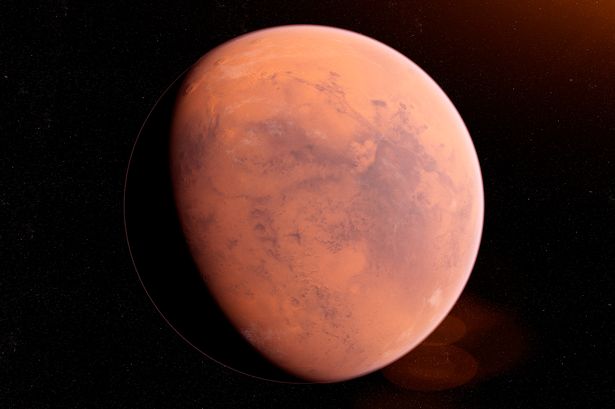Science
NASA Unveils Strongest Evidence of Life on Mars from Perseverance

NASA has made a significant announcement regarding the potential for life on Mars. The space agency revealed that a rock sample collected by the **Perseverance rover** contains what officials describe as the “clearest sign of life” ever discovered on the planet. This sample, named **Sapphire Canyon**, was obtained in **July 2022** at a site characterized by rocky outcrops near **Neretva Vallis**, a river valley that was shaped by ancient water flow into **Jezero Crater**.
During a presentation on Wednesday, NASA officials outlined the findings, emphasizing that this discovery represents the strongest evidence to date that Mars may have once supported life. Since landing on Mars in **February 2021**, the **Perseverance rover** has been exploring **Jezero Crater**, a location believed to have housed an ancient lake. The rover has collected a series of vital samples from the area, specifically from what was previously a river delta.
Of the **43 tubes** taken to Mars, **38** were designated for collecting samples, while the remaining **five** served as “witness tubes,” designed to ensure the cleanliness of the sampling system throughout the mission. As stated by NASA, “The Mars 2020 Perseverance Rover searches for signs of ancient microbial life to advance NASA’s quest to explore the past habitability of Mars.” The rover is currently gathering core samples of Martian rock and regolith, which may be returned to Earth by a future mission for in-depth analysis.
The rover has consistently transmitted images of Mars back to Earth, showcasing crystalline solids that are remnants of the water that once flowed across the planet’s surface. Scientists noted that the discovery of possible signs of life on Mars is the culmination of **three decades** of research in the field. The findings have undergone a peer-review process, confirming that the samples likely have a biological origin.
During the presentation, **Joel Hurowitz**, a scientist involved in the research, highlighted that subtle chemical signatures found within the crater suggest the possibility of life existing on Mars billions of years ago. **Professor Sanjeev Gupta**, a planetary scientist from **Imperial College London** and co-author of a study published in the journal **Nature**, remarked, “We’ve not had something like this before, so I think that’s the big deal. We have found features in the rocks that, if you saw them on Earth, could be explained by biology—by microbial processes. So we’re not saying that we found life, but we’re saying that it really gives us something to chase.”
As NASA continues its exploration of Mars, these findings open new avenues for understanding the planet’s history and its potential to have hosted life. The ongoing mission of the **Perseverance rover** not only aims to uncover the secrets of Mars but also to ignite a renewed interest in the search for life beyond Earth.
-

 Entertainment1 month ago
Entertainment1 month agoKim Cattrall Posts Cryptic Message After HBO’s Sequel Cancellation
-

 Entertainment1 month ago
Entertainment1 month agoKate Garraway Sells £2 Million Home Amid Financial Struggles
-

 Entertainment3 weeks ago
Entertainment3 weeks agoMasterChef Faces Turmoil as Tom Kerridge Withdraws from Hosting Role
-

 Entertainment1 week ago
Entertainment1 week agoITV’s I Fought the Law: Unraveling the True Story Behind the Drama
-

 Entertainment1 month ago
Entertainment1 month agoAldi Launches Cozy Autumn Fragrance Range Ahead of Halloween
-

 Entertainment2 months ago
Entertainment2 months agoSpeculation Surrounds Home and Away as Cast Departures Mount
-

 Entertainment1 month ago
Entertainment1 month agoMarkiplier Addresses AI Controversy During Livestream Response
-

 Health1 month ago
Health1 month agoWigan and Leigh Hospice Launches Major Charity Superstore
-

 Lifestyle3 weeks ago
Lifestyle3 weeks agoSummer Flags Spark Controversy Across England as Patriotism Divides
-

 Science1 month ago
Science1 month agoAstronomers Unveil New Long-Period Radio Transient ASKAP J1448−6856
-

 Entertainment1 month ago
Entertainment1 month agoLas Culturistas Awards Shine with Iconic Moments and Star Power
-

 Entertainment1 week ago
Entertainment1 week agoKatie Price Celebrates Surprise Number One Hit with Family Support




















